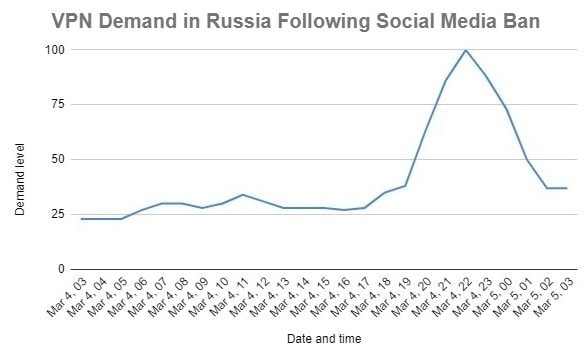
Demand for VPNs spiked to an all-time high in Russia after the government decided to block social media platforms and other websites on Friday, March 4th. Among the blocked platforms are Facebook and Twitter, in addition to several Russian-language news outlets.
This online censorship process actually began when Russia invaded Ukraine on February 24. In the Russian government’s attempt to control the information available to the country’s residents, the first steps taken were slowing down Facebook and Twitter and preventing certain images and videos from being viewed. Blocking these platforms completely, however, is a major escalation in the process.
Russian citizens’ demand for VPNs has been growing since the invasion, but we detected a major spike immediately following Russia’s announcement that these major platforms would no longer be accessible.
VPNs can allow a user to bypass government internet restrictions, as well as provide privacy and anonymity by obscuring the user’s IP address and location.
Breaking down the data by day shows that demand for VPNs significantly increased in Russia after February 26, when the government accused 10 Russian-language news outlets of spreading false information. Russia then blocked those outlets on March 1.

On March 4 at 8:30 p.m. (Moscow Time, GMT +3), Russia announced that it would block access to Facebook. VPN demand multiplied by 2 at the time of the announcement, reaching a peak 2 hours later, at a number 3 to 4 times higher than the hours and days before the announcement. Interestingly, the increase began shortly before the announcement, indicating that rumors of the block may have been circulating beforehand.
The SafetyDetectives research team found that since February 24, the demand for VPNs in Russia increased by 462%. We looked at the figures for both paid VPNs and free VPNs to calculate this average. If we were looking at free VPNs only, it’s possible the number would be much higher
In recent years, the Russian government has been trying to limit VPN usage. In 2017, it introduced a law that forces VPN providers and other anonymizers to comply with the Russian state’s blacklist of banned websites. In 2019, it started enforcing the law, demanding Hola VPN, ExpressVPN, KeepSolid VPN Unlimited, NordVPN, Speedify VPN, and IPVanish VPN to comply.
This means VPN providers are supposed to restrict Russian users from accessing banned sites, or risk the Russian government banning them too. In September of 2021, Russia banned the VPNs mentioned above for not complying with the law..
As more and more Russians start using VPNs in an attempt to bypass online censorship, it remains to be seen if additional websites or VPN apps will be blocked. At publishing time, Russia announced it would also block Zello, a communication app based in the USA.